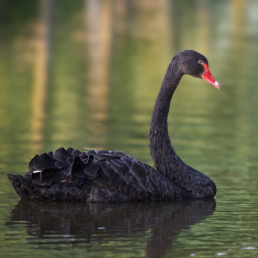

Join BirdNote tomorrow, November 30th!
Illustrator David Sibley and actor H. Jon Benjamin will face off in the bird illustration battle of the century during BirdNote's Year-end Celebration and Auction!

North American birds have declined by nearly 30 percent during the past 50 years, and we need to take bold steps to protect birds and their habitats. As a public media producer with a conservation mission, BirdNote aims to be a national leader in aligning our business practices with the principles of conservation, so that our public voice is in sync with our operations. BirdNote is committed to the following actions:
Reducing the use of paper
The BirdNote team is working diligently to reduce the use of paper and increase electronic communications with supporters and friends, which is increasingly their preference. For example, we decreased the number of direct mail appeals sent in 2020, and we no longer offer the BirdNote calendar as an "automatic" fundraising premium. We recognize that some people do not have Internet access or prefer paper-based communications, and we will continue to honor those preferences. BirdNote uses Forest Stewardship Council-certified paper in our calendar, direct mail, gift receipts, and other communications.
Increasing awareness of the lives and needs of birds
Reducing our use of paper has resulted in more resources to expand our digital communications and social media outreach with the BirdNote community. As part of our participation in the #BringBirdsBack campaign and through our partnerships with conservation organizations, BirdNote is raising awareness of practical steps we can take to help birds.

Working virtually
BirdNote staff and contractors have worked collaboratively online for over 15 years, reducing overhead costs for the organization and eliminating carbon emissions from staff commutes. Flexible schedules improve team morale and productivity, optimizing the quality of our work on behalf of birds and nature.
Telling stories digitally
The upgraded BirdNote.org, which launched in July 2020, improved our capacity to share stories and resources that advance our conservation mission. BirdNote programming is free and accessible to all, thanks to the support of individuals, foundations, and businesses.

Supporting conservation through travel
BirdNote believes ecotourism can be a stabilizing force in a world where the value of wildlife and habitat is in constant competition with resource extraction and other forms of ecosystem destruction. We also believe that “transformational travel” experiences — including those that connect travelers with local people and local issues — inspire both travelers and residents to engage more deeply in conservation and social justice initiatives. The BirdNote adventure travel program operates from these core principles. Participants are encouraged to purchase carbon offsets to reduce the impact of each trip and work toward a “net positive” effect. Learn how ecotourism can be a "win-win" in this blog written by Gordon Orians, PhD, our senior science advisor.
Note: the BirdNote travel program has been paused in response to the COVID-19 pandemic. Learn more about past trips here.
In addition to these business practices, here are some of the ways that our staff, contractors, and board members are working to live in greater harmony with birds and nature:
- Using public transportation and alternative forms of transportation such as biking and walking whenever possible
- Embracing the one-car household
- Making bird-friendly consumer choices, such as 100% recycled paper products, shade-grown coffee in reusable cups, sustainable seafood, organic fruits and vegetables, and FSC-certified forestry products
- Eating less meat or adopting vegetarian/vegan diets and lifestyles
- Reducing consumption of plastic and single-use paper products
- Planting native plants and avoiding pesticides and herbicides
- Avoiding harmful chemicals when controlling pests, such as rodenticides that pose secondary poisoning risks to birds
- Keeping cats indoors
- Making windows safer for birds
- Engaging in the “buy nothing” movement to reduce consumption of new goods whenever possible
- Choosing energy-efficient appliances and products
- Setting the thermostat carefully to avoid wasting energy
- Considering the carbon footprint of online purchases vs. local shopping
- Decreasing waste by donating unwanted clothing and household items, recycling, and composting

Violet-green Swallow © Tom Grey
Short-billed Dowitcher © Owen Deutsch
Western Meadowlark © Gregg Thompson
Peregrine Falcon © Greg Lavaty
